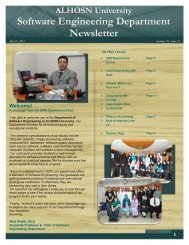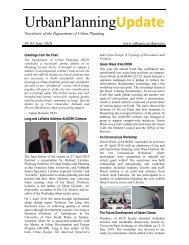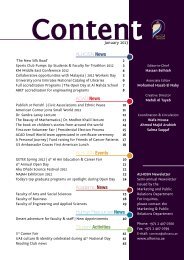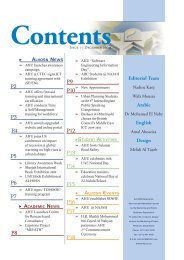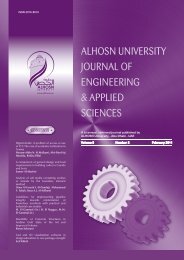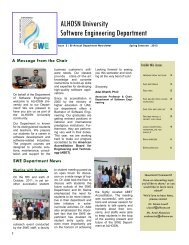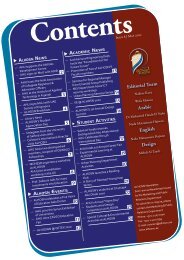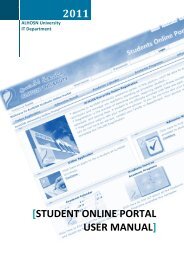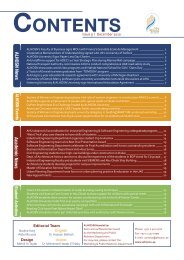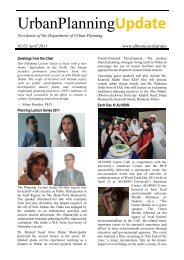ALHOSN University Catalogue Global Knowledge with Local Vision ...
ALHOSN University Catalogue Global Knowledge with Local Vision ...
ALHOSN University Catalogue Global Knowledge with Local Vision ...
You also want an ePaper? Increase the reach of your titles
YUMPU automatically turns print PDFs into web optimized ePapers that Google loves.
Prerequisite: MEC 323<br />
The Bachelor of Science in Mechanical Engineering (BSME) is designed to prepare students for a successful<br />
career in the mechanical engineering “industry”, particularly the sector dealing <strong>with</strong> infrastructures,<br />
manufacturing, energy, and the environment. Students are exposed to a wide range of theories and practices of<br />
mechanical engineering through a series of dynamic curricula. This is done through the selection of elective<br />
courses in various topics. The Industrial Training/Internship course is specifically designed to assimilate students<br />
into the industrial culture before even they graduate. By spending the summer <strong>with</strong>in the industry, engineering<br />
students are likely to gather invaluable experience <strong>with</strong>out the added stress that accompanies full-time<br />
employment. At the same time, students will have the option of impressing upon their future employers and<br />
securing future employment. The potential employers will have the unique opportunity to benefit from the<br />
service provided by engineering students who are at the peak of their creativity. The employer also will have an<br />
opportunity to impress upon the future engineers who would be able to carry the name of the company. For<br />
engineering, this program can save large sum of money for the company in training professionals and secure job<br />
opportunities for the students. It is well known that major companies spend as much money in training new<br />
employees as often needed for students to go through the entire university program.<br />
Concentration 1: Thermo-Fluid and Energy<br />
MEC 430 Refrigeration and Air Conditioning (3 = 2 + 1)<br />
Pre(Co)requisites: MEC 215 (MEC 413)<br />
This course aims at introducing basic concepts of refrigeration and air conditioning. Topics covered include single<br />
and multi-pressure vapor compression cycles, refrigerants, components characteristics, absorption refrigeration<br />
cycles, introduction to air conditioning, load estimation, psychometric representation, air conditioning systems.<br />
MEC 431 Air Conditioning Systems (3 = 3 + 0)<br />
Pre(Co)requisites: MEC 323, MEC 324 (MEC 413)<br />
Air-conditioning Systems, cooling load calculations, types of air-conditioning systems, central stations: all-air<br />
systems: fixed and variable-air-volume, air distribution systems, controlling flow rate. Cooling water systems:<br />
water chillers, design systems of water distribution. Matching of different components of the system vibration<br />
and noise problems in the air-conditioning systems.<br />
MEC 436 Turbomachinery (3 = 3 + 0)<br />
Prerequisites: MEC 323, MEC 324<br />
This course covers a broad treatment of axial and radial turbomachines, thermofluidynamics aspects of fluid<br />
flow, dimensional analysis, basic laws and equations, hydraulic pumps, pump and system matching, centrifugal<br />
compressors and fans, pre-whirl, surging, choking, axial compressors and fans, stage reaction and stage loading,<br />
multi-stage performance, axial-flow ducted fans, axial and radial flow turbines, stator and rotor losses,<br />
efficiencies, and preliminary design fundamentals of turbomachines and three-dimensional considerations.<br />
MEC 440 Thermal and Mechanical Design of Nuclear Power Reactors (3 = 3 + 0)<br />
Pre(Co)requisites: MEC 324, MEC 406 (MEC 413)<br />
This course covers the basic principles of the thermo-mechanical design and analysis of nuclear power<br />
reactors. Topics include: reactor heat generation and removal; steady- and unsteady-state conduction in reactor<br />
elements; single phase, two-phase, and liquid metal cooling; core thermal design.<br />
MEC 441 Environmental Effects of Radiation and Radioactive Waste Management (3 = 3 + 0)<br />
Prerequisite: MEC 406<br />
This course investigates natural and artificial environmental radiation including units and measurements,<br />
biological effects, maximum permissible public dose, release of radioisotopes to the environment, dispersion in<br />
the atmosphere and aquatic environment, food chain, meteorological, geologic, hydrologic and seismic<br />
characteristics, derived emission limits, radiation dose. Topics on radioactive waste include the origin of low,<br />
intermediate and high activity waste, forms and quantity of radioactive waste, production of radioactive waste at<br />
each stage of the nuclear cycle, fuel fabrication, reactor operation and maintenance, spent fuel, medical and<br />
industrial waste, handling, transporting, storing and disposing technologies, on-site and off-site storage, spent fuel<br />
reprocessing and disposal methods, radioactive waste management plans and practices in various countries, and<br />
public concerns and perception of radioactive waste management.<br />
MEC 442 Nuclear Plant Operation and Reactor Control (3 = 3 + 0)<br />
Pre(Co)requisites: MEC 322, MEC 406 (MEC 413)<br />
This course constitutes an optional course in Mechanical engineering department. The aim of this course is to<br />
introduce the concepts of nuclear engineering and the resulting applications. The subject which will be discussed<br />
are principle of nuclear energetic; nuclear reactor design and cooling; nuclear propulsion; boiling water reactors<br />
and pressurized water reactors; reactor protection and safeguards actuation; nuclear waste disposal.<br />
121




